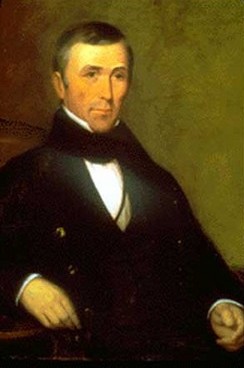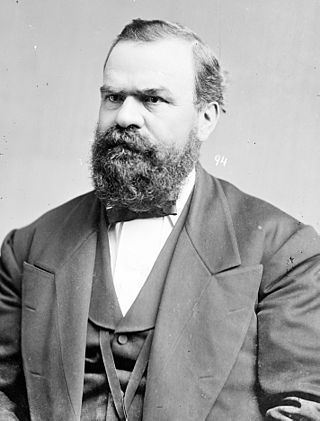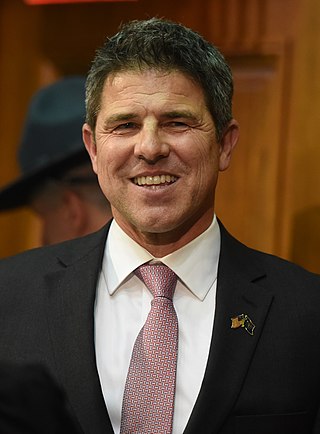Related Research Articles

William Hendricks was a Democratic-Republican member of the House of Representatives from 1816 to 1822,the third governor of Indiana from 1822 to 1825,and an Anti-Jacksonian member of the U.S. Senate from 1825 to 1837. He led much of his family into politics and founded one of the largest political families in Indiana. He was the uncle of Thomas Andrews Hendricks,who was also Governor of Indiana and Vice President of the United States. Hendricks County was named in his honor. His term as governor was spent repairing the state's finances to later enable large scale internal improvements. The establishment of the basic framework of the state's public school system and the transfer of the capital from Corydon to Indianapolis also occurred during his term.

Ratliff Boon was an American politician who briefly served as the second Governor of Indiana — taking office following the resignation of Governor Jonathan Jennings,whom he served as lieutenant governor under,after his election to Congress,and subsequently serving again as lieutenant governor under Governor William Hendricks —and a six-term member of the United States House of Representatives. A prominent politician in the state,Boon was instrumental in the formation of the state Democratic Party,and he supported President Andrew Jackson's policies while in the House.

Jeptha Dudley New was a U.S. Representative from Indiana. He was the grandson of Jethro New,nephew of Robert A. New,brother of John C. New,and uncle of Harry Stewart New.
Lucien Barbour was an American lawyer and politician who served one term as a U.S. Representative from Indiana from 1855 to 1857.

Stanton Judkins Peelle was an American politician and judge who served as a United States representative from Indiana and both an associate judge and chief justice of the Court of Claims.

William Dallas Bynum was an American lawyer and politician who served five consecutive terms as a U.S. Representative from Indiana from 1885 to 1895.

William Watson Wick was a U.S. Representative from Indiana and Secretary of State of Indiana. He was a lawyer and over his career he was a judge for 15 years. President Franklin Pierce appointed him Postmaster of Indianapolis,Indiana.
William John Brown was a U.S. Representative from Indiana.
William Van Ness Bay was an American attorney and judge from Missouri. He was most notable for serving as U.S. Representative from Missouri from 1849 to 1851,and a judge of the Supreme Court of Missouri from 1862 to 1865.
Thomas Jefferson Wood was an American politician who was a member of the United States House of Representatives from Indiana.

Benjamin Parke was an American lawyer,politician,militia officer,businessman,treaty negotiator in the Indiana Territory who also served as a United States federal judge in Indiana after it attained statehood in 1816. Parke was the Indiana Territory's attorney general (1804–1808);a representative to the territory's first general assembly (1805);its first territorial delegate to the United States House of Representatives (1805–1808);one of the five Knox County delegates to the Indiana constitutional convention of 1816;and a territorial court judge (1808–1816). After Indiana attained statehood,Parke served as the first United States District Judge of the United States District Court for the District of Indiana (1817–1835).

Edmund Waddill Jr. was Virginia lawyer and Republican politician who became a United States representative from Virginia's 3rd congressional district,as well as served as both a trial and appellate judge. Before his legislative service,he was a Virginia trial judge,and afterward became a United States district judge of the United States District Court for the Eastern District of Virginia and still later served on the United States Court of Appeals for the Fourth Circuit.
Horatio C. Newcomb was an attorney and judge from Indianapolis,Indiana,United States. He also served as the second mayor of Indianapolis.
Samuel H. Buskirk was a lawyer,politician,and justice of the Indiana Supreme Court.

Rodric D. "Rod" Bray is an American politician from Indiana. A member of the Republican Party,Bray has been a member of the Indiana State Senate since 2012,representing the 37th state Senate district,which comprises all of Morgan County and a portion of Johnson,Owen and Putnam counties.

Addison Clay Harris was a lawyer and civic leader in Indianapolis,Indiana,who served as a Republican member of the Indiana Senate and a U.S. Envoy Extraordinary and Minister Plenipotentiary (ambassador) to Austria-Hungary. The Wayne County,Indiana,native graduated from Northwestern Christian University in 1862 and was admitted to the bar in 1865,the same year he established a law partnership with John T. Dye in Indianapolis. Harris was a founding member (1878) and president of the Indianapolis Bar Association;a founder and president of the Indiana Law School,which was a forerunner to the Indiana University Robert H. McKinney School of Law in Indianapolis;a presidential elector in 1896;president of the Indiana State Bar Association (1904);a member (1905–1916) and president of Purdue University's board of trustees;and a member of the Indiana Historical Society and the Columbia Club.
Joseph S. Dailey was an American politician,lawyer,and judge who served as a justice of the Indiana Supreme Court from June 25,1893 to January 7,1895.
James Cook Denny was an American lawyer,judge,and politician who served as the ninth Indiana Attorney General from November 3,1872 to November 6,1874.
Clarence Augustus Buskirk was an American lawyer,politician,poet,and lecturer who served as the tenth Indiana Attorney General from November 6,1874,to November 6,1878. Later in his life,he became a prominent promoter of Christian Science.
Daniel Pratt Baldwin was an American lawyer,judge,politician,banker,writer,lecturer,and philanthropist who served as the twelfth Indiana Attorney General from November 6,1880 to November 6,1882.
References
- 1 2 3 4 5 Monks, Leander John (1916). Courts and lawyers of Indiana. Indianapolis: Federal Publishing Company.
- ↑ "Attorneys General of Indiana". Indiana State Library.
- 1 2 3 4 5 A Biographical History of Eminent and Self-made Men of the State of Indiana. Cincinnati: Western Biographical Publishing Company. 1880. pp. 245–246.
- ↑ Bergen, John V. (September 1981). "David D. Banta's Memorial to John R. Kerr, Blind Printer and Pioneer Editor in Johnson County, Indiana". Indiana Magazine of History. 77 (3): 231–245. JSTOR 27790542.
- ↑ "David Banta (1889-1896)". Maurer School of Law Digital Repository. Indiana University Bloomington.
- ↑ "Indiana State Sentinel, Volume 27, Number 30, Indianapolis, Marion County, 13 March 1878". Indiana State Sentinel. 13 March 1878.
